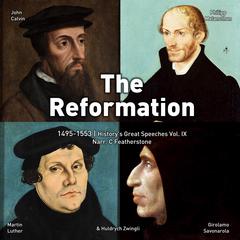 Audio Sample Unavailable
Audio Sample Unavailable
Bondage of the Will Audiobook
 Audio Sample Unavailable
Audio Sample Unavailable
Quick Stats About this Audiobook
Total Audiobook Chapters:
Longest Chapter Length:
Shortest Chapter Length:
Average Chapter Length:
Audiobooks by this Author:
Publisher Description
First published in 1525, Martin Luther's Bondage of the Will is acknowledged by theologians as one of the great masterpieces of the Reformation. It is Luther response to Desiderius Erasmus' Diatribe on Free Will, written in his direct and unique style, combining deep spirituality with humor.
Download and start listening now!
"Luther admitted he thought this was his best work and I am inclined to agree. In this response to Erasmus of Rotterdam he presents a compelling case for the exhaustive sovereignty of God over all of creation and particularly in electing and predestining those whom he saves, he also shows how this does not conflict with the idea that man is held responsible for his sin, addressing the same question Paul does in Romans 9, "How can [God] still blame us, if no one resists his will?" Luther's writing is sharp and especially entertaining at points where he chides his opponent. It is well worth a thorough read. Also, I recommend getting the Library of Christian Classics publication "Luther and Erasmus: Free Will and Salvation" and read Erasmus first since this is Luther's response to him and you can admire the slick and ascerbic wit of Erasmus to get a feeling for what kind of rhetorical opposition Luther was up against. I think it was a bad move on the part of the publisher of this particular edition to isolate Luther's reponse without giving Erasmus his 5 cents, that's only fair. Neverthless, Luther's response is so thorough as he re-states and handles each of Erasmus' arguments that it is capable of standing on its own."
— Christopher (5 out of 5 stars)
Bondage of the Will Listener Reviews
-
" Communicates the important doctrine of human depravity while blasting the Diatribe of Erasmus (quite entertaining at times). "
— Daniel, 2/10/2014 -
" Great for understanding historical Protestant theology. A classic work on monergism in Salvation. Much of what Luther says, in response to Erasmus, is the same between Calvinism and Arminianism. "
— Claudiu, 1/31/2014 -
" This book had a huge impact on my life in studying the views of Martin luther and his opponent Erasmas. It was my favorite literature book during school last year. "
— Andralea, 1/30/2014 -
" This may be the single best book on the relationship of man's responsibilty and volition. Aside from providing several good chuckles, Luther does a great job illustrating the function and restrictions of man's will as a result of our sin nature. I highly recommend this book to you! "
— Stephen, 1/29/2014 -
" A definite must read for Reformed and non-Reformed interested in interacting with the doctrine of soteriology. Luther interacts with Erasmus on whether man is totally depraved/radically corrupted or whether is totally depraved but still has the ability to respond to the Gospel without regeneration first happening. Luther does not handle Erasmus with kid gloves and addresses some of more commonly raised objections and scriptures used to buffet the doctrine of total depravity. "
— Andre, 1/28/2014 -
" Classic work by Luther showing the need of regeneration before faith. Also really shows that Luther was more reformed in his soteriology than modern Lutherans. "
— Bob, 1/26/2014 -
" One of my top five books of all time. No book has ever stretched my brain quite like this one. "
— Ron, 1/18/2014 -
" Very smooth translation with British spelling. Preface is lacking in Lutheran understanding; leans Calvinist. "
— Matt, 12/5/2013 -
" Deeper understanding or our reformed theology "
— Michael, 10/5/2013 -
" majorly affected my thinking when i was first introduced to the doctrines of grace. still one of the seminal texts on total depravity and worldview, in my opinion. "
— Adam, 8/19/2013 -
" There are some shining, Christological moments, but the logic which Luther uses still strikes me as convoluted in places, and the tone is generally awful (e.g., anyone who disagrees with Luther's views on the subject couldn't possibly be a Christian). "
— Matt, 7/24/2013
About Martin Luther
Martin Luther (1483–1546) was a German scholar, priest, theologian, and religious reformer and is considered one of the chief figures in European history. Arguing that money couldn’t buy freedom from God’s punishment for one’s sins, he laid the foundation for Protestant Reformation and greatly influenced the fields of politics, religion, education, and economics through his work and writings.
About Wanda McCaddon
Wanda McCaddon (d. 2023) narrated well over six hundred titles for major audiobook publishers, sometimes with the pseudonym Nadia May or Donada Peters. She earned the prestigious Audio Award for best narration and numerous Earphones Awards. She was named a Golden Voice by AudioFile magazine.






























